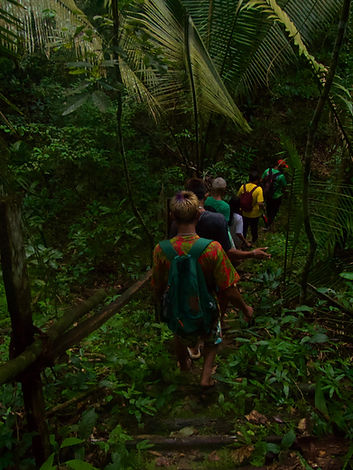

Sixth reFloresta journey
Our journey took place from July 2nd to 9th, 2025, marking the movement’s sixth overall journey, the third of the year, and the fourth in the village of Atodi. We were 42 participants — 24 from the Amazon region and 18 from other parts of Brazil. It was in this gathering, at the crossroads of so many paths, that we shaped extraordinary days together: sharing experiences, teaching and learning from each other, and dreaming of a future guided by the principle that a standing forest is worth more than anything.
We sailed beneath a blue sky and starry nights, entering the Arapiuns River on our way to Atodi. Upon arrival, we were warmly welcomed by this beautiful community — open-hearted in sharing their identity, strength, challenges, and resilience.
The following day, we experienced one of the highlights of the journey: a day on the trail. We immersed ourselves in the Amazon rainforest through the eyes of community members who introduced us to numerous fruits, medicinal trees, and plants. We reached a lookout point with a breathtaking view, refreshed ourselves in a crystal-clear stream, and crossed the igapó by canoe — an unforgettable experience.
On the fourth day, we had the privilege of meeting several local family leaders. Dividing into groups, we visited homes to talk directly with community members. We learned deeply about local health and its close connection to food. We recognized the importance of family ties, volunteerism, and solidarity in building a strong community. Above all, we became aware of the pressures faced by the territory — external forces working to weaken the community, sow division, impair access to education, and impact well-being.

Puxirum
The collective spirit and strengthening of bonds forged during the 6th Journey found expression in the Puxirum. A word from the Tupi-Guarani language meaning “mutirão” or collective effort, it was during this moment that we built the community garden located at Atodi’s municipal school.
This was a deeply meaningful and special time, where we and the community worked in harmony. Divided into four groups, some of us focused on carpentry, building the garden’s base to hold the soil prepared by another team, while the other two groups gathered straw and logs to create the garden’s roof.
Atodi’s municipal school, built in 1955 and never renovated until recently, was restored and handed over by the Santarém City Hall in December 2024. The creation of the garden within this educational space adds to the community’s achievements and marks progress in accessibility and the rights of Atodi’s residents.
Beyond the hard work and sweat, the Puxirum was full of exchanges, smiles, and learning. We understood that it’s about giving and receiving — but above all, listening to the community in shaping and carrying out these collective efforts. And so, with many hands working together, life was planted in the community garden.



Cultural Night
On the evening of July 7th, we invited the Atodi community to join us for Cultural Night — a heartfelt celebration marking the close of our journey. Between rounds of bingo enthusiastically led by Jocivaldo, president of the Atodi Community Residents’ Association, the village’s large shed came alive with a rich variety of performances. From guitar songs and poetry slams to rhyme battles, theater, and Carimbó dances, the evening was filled with joy — yet beneath it all, a bittersweet awareness of the impending farewell grew.
The diversity of the performances perfectly reflected what we learned throughout the journey: true social change doesn’t come from one-sided aid, but from mutual exchange between cultures, communities, and people. We learned from Atodi, and Atodi learned from us. We witnessed their surprise at our genuine desire to understand them, and their warm eagerness to know us in return.
We realized the difference between simply watching a traditional Indigenous dance and knowing the names and stories of those performing it. Knowing it was Sabrina and Sofia, painted with genipap. We understood how Carimbó becomes even more alive when led by Samuel, starring Maísa or Messias. How rhyme battles are more vibrant with Dirleide and Jadir.
And as if the cultural display wasn’t enough, the emotional closing at our final ciranda was even more special. The song introduced on the first day, sung every morning, rose in a beautiful chorus among all the friends we had made. Not yet ready to part, we danced the Pará square dance, laughing until exhaustion sent us out of the hut, tears of farewell flowing freely. It settled in that the journey was ending — but also that it was just beginning. The meaning of what it means to be part of reFLORESTA became ever clearer.








